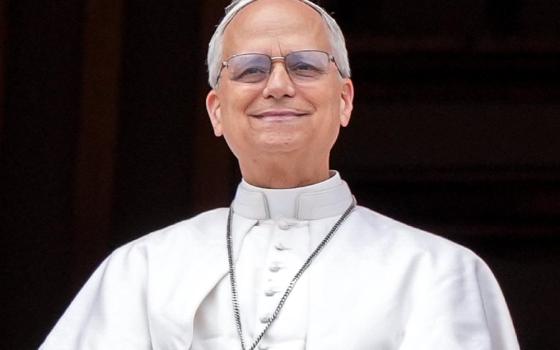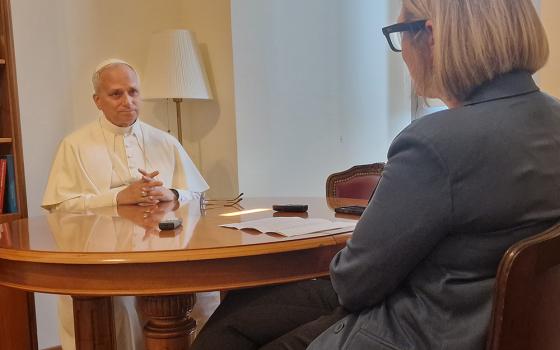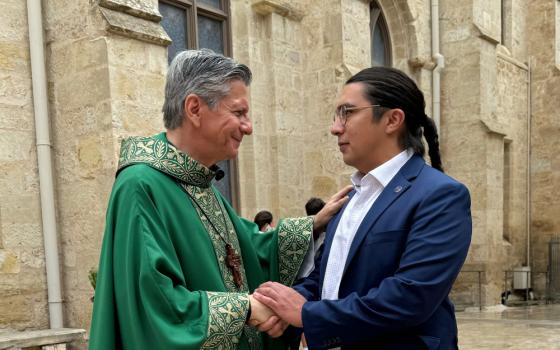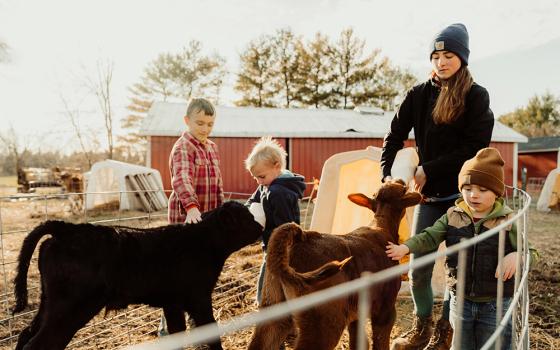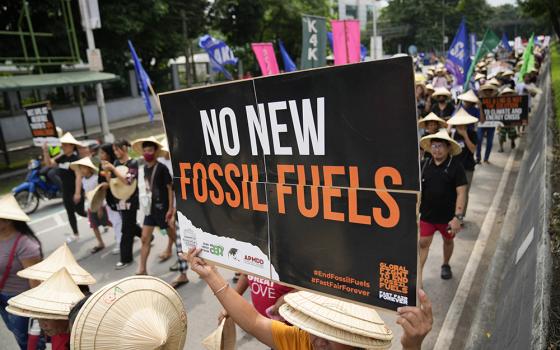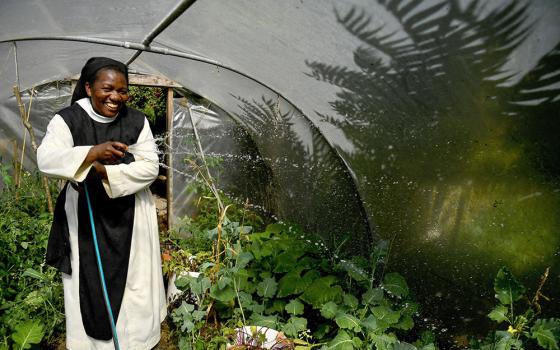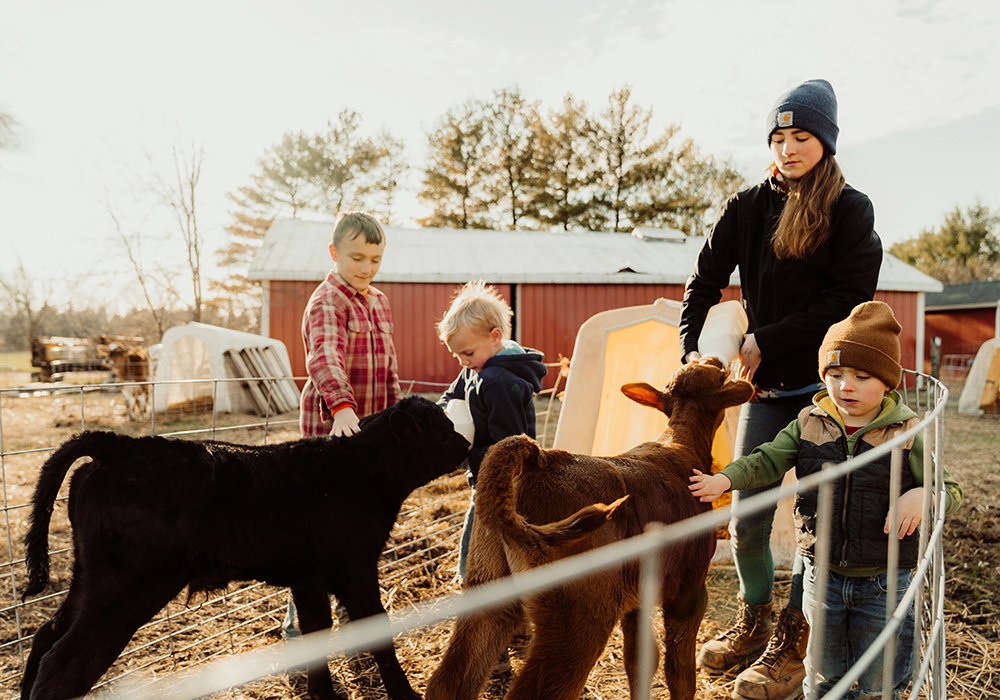
Dan and Whitney Belprez of Two Sparrows Farms in Michigan include their four children in farm duties, like milking the cows. (Courtesy of Diocese of Lansing)
Catholic climate efforts are taking root in the countryside — where parishes and lay-led groups draw on long-standing agrarian traditions and the Catholic understanding of stewardship to address contemporary crises.
By embracing the Catholic principle of "care for our common home," articulated by Pope Francis in his encyclical Laudato Si', rural initiatives challenge the idea that small-town faith communities are indifferent to environmental justice and invite the entire church to recognize that care for creation is not merely an urban or academic concern, but a lived reality for farm families and reservation communities.
Catholic Rural Life, founded in 1923, promotes sustainable farming, agrarian spirituality and community solidarity. The group's chapters across the country celebrate "Blessings of Seeds and Fields," honor St. Isidore the Farmer and encourage parishes to see their land as a locus for ecological witness.
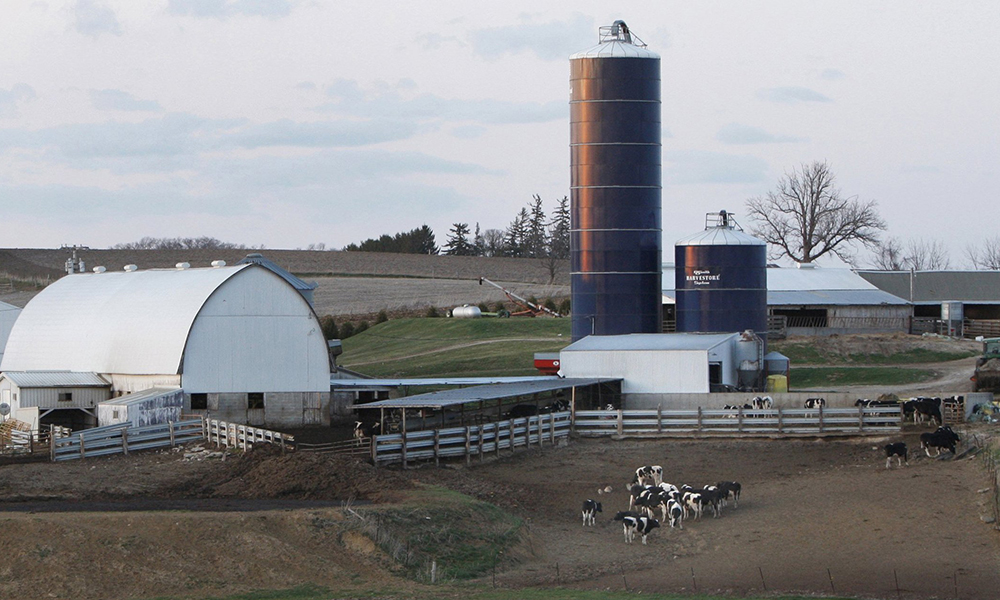
Cows are pictured in a file photo grazing on a farm just outside Postville, Iowa. For the past 100 years, Catholic Rural Life, based in St. Paul, Minnesota, has ministered to Catholics who live and work in a rural setting. (OSV News/CNS file, Bob Roller)
Such liturgical and educational activities reflect an understanding — articulated by Francis in Laudato Si' — that "land is not a commodity but rather a gift from God," humans "were not meant to be inundated by cement, asphalt, glass and metal, and deprived of physical contact with nature" and we must recognize "every creature has its own value and significance."
In Nebraska, the Archdiocese of Omaha has demonstrated diocesan-level engagement with Laudato Si'.
On Aug. 17, 2024, Archbishop George J. Lucas convened leaders from government, business, agriculture, education, nonprofit and religious sectors for a day of reflection on ecological responsibility. Participants discussed local environmental challenges — from declining water tables to soil erosion — and explored opportunities for collaboration.
According to The Catholic Voice, the archdiocese emphasized a diocesan commitment to hearing the cry of the Earth and the cry of the poor, aligning Omaha's priorities with the guidance of Francis as laid out in Laudato Si' and followed up with the Vatican's Laudato Si' Action Platform.
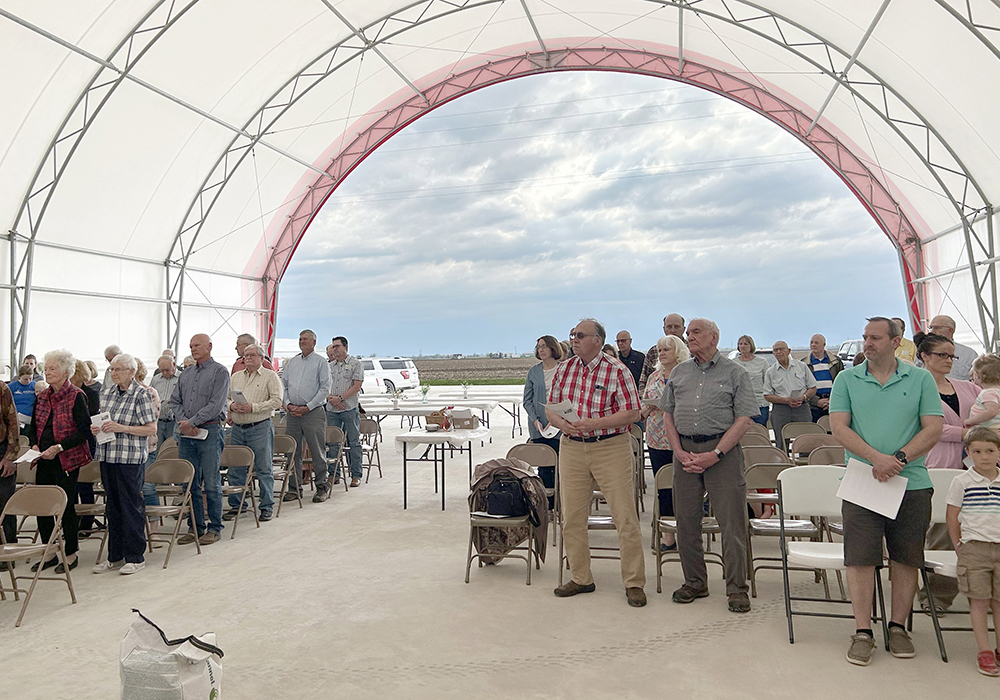
Worshippers pray in the hoop barn on the Pieper family farm in Donnellson, Iowa, during a Mass for the farm and the blessing of seeds April 15, 2023. Fr. Dan Dorau celebrated the Mass, whose inspiration comes from Catholic Rural Life. The four parishes he leads in Lee and Van Buren counties collaborated. (OSV News/The Catholic Messenger/Barb Arland-Fye)
Alongside diocesan efforts, grassroots Catholic farming initiatives are emerging in Nebraska parishes. Though specific parish farms remain relatively rare, several Catholic Rural Life-Lincoln chapter activities show a broad trend.
The group's Lincoln chapter organizes Masses and prayer services at seasonal agricultural events like local tractor shows and on farms, teaching families to see their daily work and the land as sacred parts of God's creation, linking Eucharistic celebrations to the soil that nourishes them.
Catholic family farmers like Dan and Whitney Belprez in Michigan and Brad and Leanne Donnay in Minnesota show that small-scale, family-centered agriculture provides a lived experience of God's creation.
Dan and Whitney Belprez, who run Two Sparrows Farms and were featured by National Catholic Register last year, have adopted regenerative agriculture models.
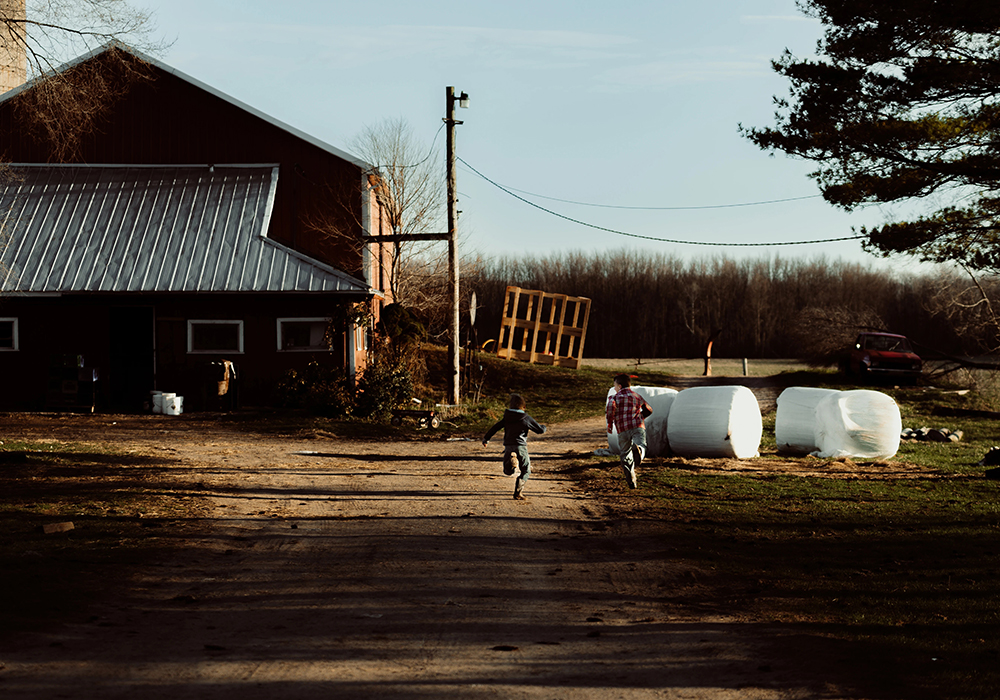
Two Sparrows Farms in Michigan (Courtesy of Diocese of Lansing)
The Belprez family practices soil conservation and biodiversity enhancement. They rotate their cattle on pasture every 24 hours for most of the year. Whitney Belprez told the Register, "We farm in unison with nature instead of in opposition to it," adding, "We honor the cow as an herbivore and steward the land in the best way possible."
Brad and Leanne Donnay and their 10-acre dairy farm in Kimball were featured by The Central Minnesota Catholic in 2022. "Caring for the land is important to us, as is sharing our story with others," Brad Donnay told the outlet. "I'm not trying to showcase Donnay Dairy like an advertisement, but we're doing things that might inspire others to be good stewards for Minnesota's land." According to the publication, they support Upstream, an initiative that shares ways Minnesotans care for the state's natural places.
Consumers' demand for sustainably produced food is crucial for sustaining eco-friendly farms, but a vocational shift — seeing farming as a divine calling — must originate within the farming community.
This shift can then signify to the rest of the church how care for creation connects faith with farming.
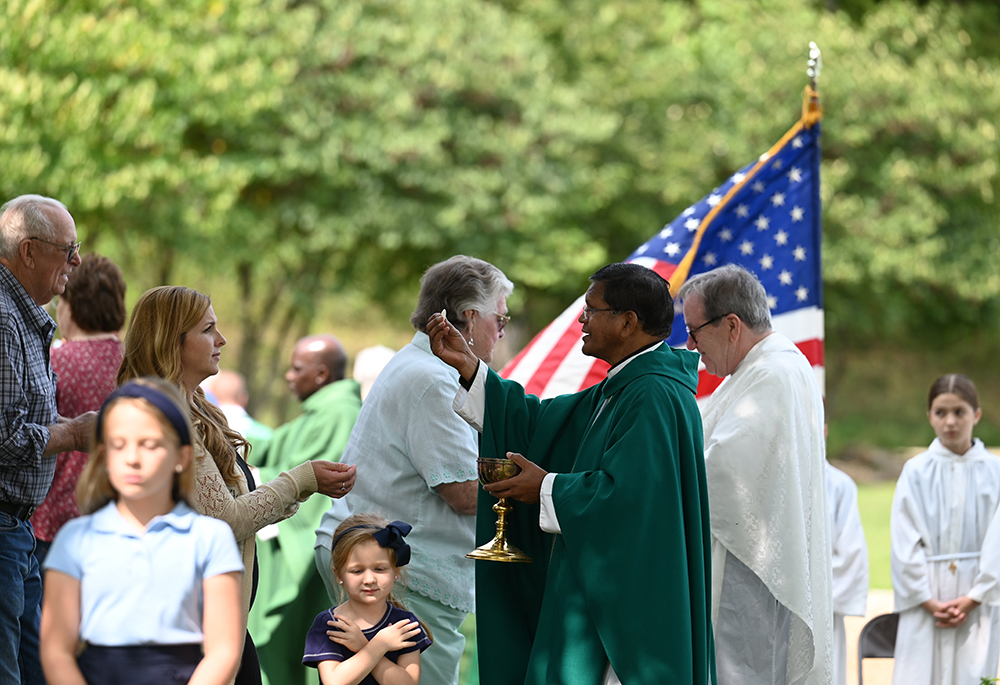
Fr. Basil Tigga and Fr. Matthew Flatley distribute Communion during the inaugural Rural Life Mass of the Diocese of Jefferson City, Missouri, on the Steinman family farm near Vienna Sept. 8, 2024. (OSV News/The Catholic Missourian/Annie Williams)
In other rural communities, social justice ministries to address the cry of the poor — which Francis in Laudato Si' connects to the cry of the Earth — often intersect with Indigenous needs.
Mission churches like Our Lady of Lourdes in Poplar (on the Fort Peck Indian Reservation) in Montana serve communities where 95% of parishioners are Native American. Under the leadership of Fr. Anietie Akama Ukanide, a priest of the Missionary Society of St. Paul, the parish functions as a critical refuge — providing warm meals, clothing and pastoral care.
Advertisement
On the Flathead Reservation in Montana (St. John Berchmans, Sacred Heart and St. Ignatius), where mission churches rely on Native lay leaders and religious sisters to lead ministries, Megan Callahan combines religious education with meals for food-insecure youth. This approach reflects the integral ecology emphasized by Francis, which promotes integrated solutions to various social and environmental challenges.
These mission-driven efforts also underscore Francis' insistence that "indigenous communities … should be the principal dialogue partners" in projects affecting their land.
Despite this work in the spirit of Laudato Si', rural Catholics who act with care for creation as a priority face significant challenges. Many farm families operate on razor-thin margins and confront political cultures that resist environmental regulations.
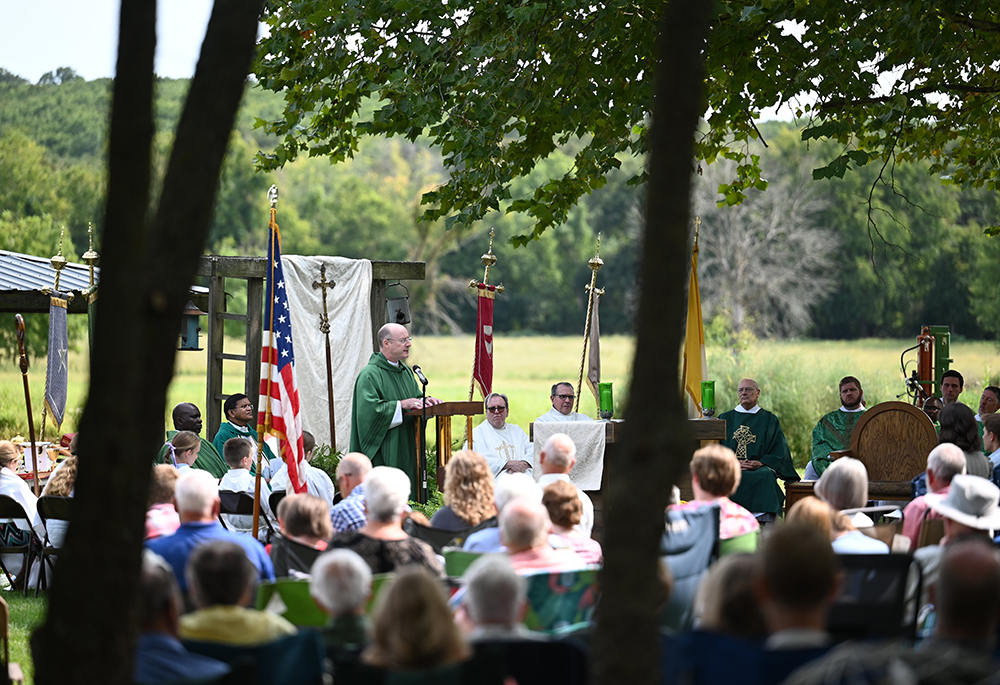
Then-Bishop Shawn McKnight of Jefferson City, Missouri, surrounded by eight concelebrating priests and about 350 people from parishes all over the diocese, preaches the homily during the diocese’s inaugural Rural Life Mass Sept. 8, 2024, on the Steinman family farm near Vienna. Congregants were seated on lawn chairs, blankets or hay bales under shade trees in the late-summer sun. (OSV News/The Catholic Missourian/Annie Williams)
In parts of Nebraska, long-standing mind-your-own-business values can make collective action difficult. Yet, as then-Bishop Shawn McKnight of Jefferson City said in a homily at a 2024 Rural Life Mass in Missouri, his experience of farm life in Nebraska firsthand fostered in him an appreciation of creation's sacredness. (McKnight is now archbishop of Kansas City, Kansas.)
Economic pressures — such as volatile commodity prices and corporate consolidation — further complicate efforts to adopt sustainable practices on family farms and in rural communities. Nevertheless, parishes that host "Rural Life Sunday" celebrations or feature Laudato Si' bulletin articles demonstrate that even amid adversity, faith communities can cultivate ecological consciousness.
These rural movements carry profound significance for the wider church and contribute to an evolving Catholic identity — one that integrates social justice, agrarian ethics and environmental responsibility. By challenging stereotypes that associate rural faith with ecological indifference, these communities demonstrate that care for our common home can be authentically lived in any context.
